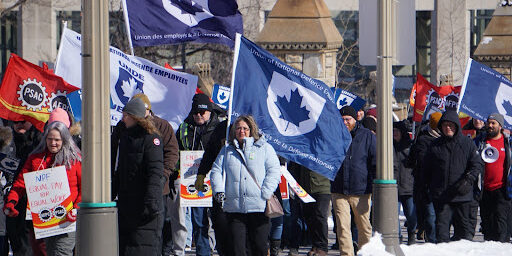The latest action from Public Service Alliance of Canada’s (PSAC) and its component, the Union of National Defense Employees (UNDE), highlights the disrespect federal public servants are facing at every bargaining table.
PSAC and UNDE members working for Non-Public Funds (NPF) rallied at the Prime Minister’s office on Friday, February 24. Workers were calling for fair wages, good working conditions and inclusive workplaces.
These workers provide direct support to military members. Members are employed in mess halls as bartenders, in the kitchen as helpers and cooks. NPF workers also provide some personal training, childcare and look after libraries, gyms, pools and other facilities.
“Most of our members working for Non-Public Funds earn less than fast-food chain employees,” UNDE National President June Winger said in a statement. “That makes it really difficult to recruit and retain workers, and has a direct impact on services provided to our military personnel and their families. This is totally unacceptable.”
Each location where NPF workers are employed function as their own bargaining unit. Since September, talks with NPF have reached an impasse on one table after another, according to an email statement from PSAC.
“In the Quebec region, their contract was expiring first,” Winger explained in an interview with rabble.ca. “And, and now it’s rolling out to the others as well. We’re seeing the same sort of lack of willingness to find a good settlement at every table.”
Part of the roadblock to a good deal, according to Winger, is that management is trying to side-step responsibility by saying they have limited authority in what they can offer.
“They’ve been telling us that we should be mobilizing our members. They’ve been telling us that we should be contacting the defense minister, the chief of defense staff, and all these people,” Winger said. “They say that they simply don’t have any authority without getting the approval from them. So management’s playing a game here and we don’t want to play that game.”
Bargaining is stalling across PSAC units
The difficulties NPF workers are facing at the table reflect the hardships many other PSAC bargaining teams are dealing with. Groups representing members working under the Treasury Board launched strike votes in January. Votes will be collected until the end of April.
“All the members right across the country, regardless of who their employer is, are in the same boat here,” Winger said. “We’re all supporting one another and we know that we have to stick together to be able to give the greatest leverage to make sure that we’re paid fairly. Regardless of who we work for, or what job we do, we all deserve to have a fair wage, we all deserve good working conditions.”
NPF bargaining teams in Quebec are waiting to speak to a Public Interest Commission (PIC) to help move talks along. However, Winger said that there are some flaws with the reports that are published by PICs.
“The problem is there’s no teeth to it, it’s just a non-binding recommendation,” Winger said. “Essentially, it’s a speed bump in the process. That’s too bad, because it could be so much more.”
Even if PIC reports had a stronger impact on bargaining, PSAC teams representing workers under the Treasury Board have found that the recommendations themselves are not strong enough.
In a statement released on February 7, PSAC said that the PIC reports followed a pattern of unclear recommendations. A statement released on February 27 noted that the new PIC report for the common issues table “offers a pathway to make gains for workers, but still falls short of PSAC’s demands.”
Chris Aylward, National President of PSAC previously said to rabble.ca that the government, as Canada’s largest employers, must set a good example for how to treat workers. Bargaining units and teams, such as the teams representing NPF workers, are running into resistance when demanding fair wages and good working conditions. So far, the example being set is bleak.



